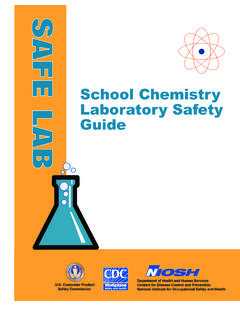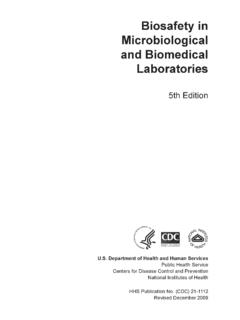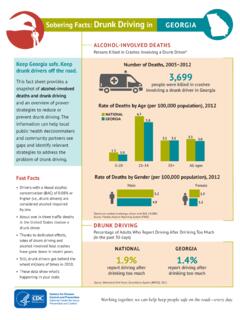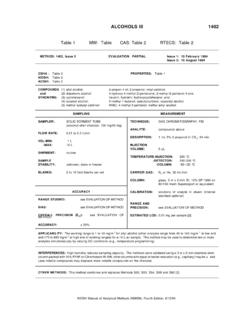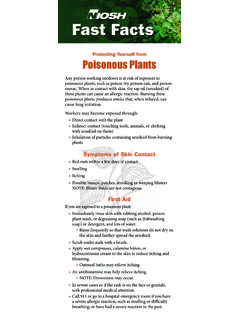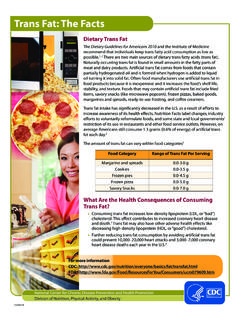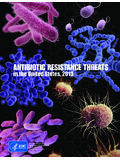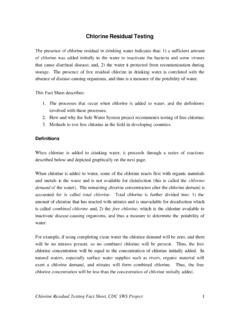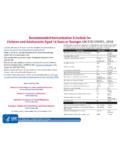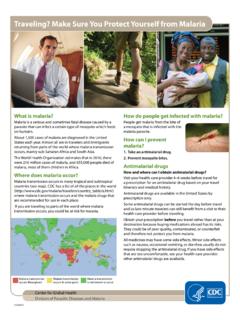Transcription of Criteria for the processing of dengue samples at the …
1 Public Health Service DEPARTMENT OF HEALTH & HUMAN SERVICES CDC dengue Branch Division of Vector-Borne Diseases National Center for Emerging and Zoonotic Infectious Diseases 1324 Ca ada Street San Juan, Puerto Rico 00920-3860 Tel: 787-706-2399; Fax: 787-706-2496 Criteria for the processing of dengue samples at the CDC dengue Branch, San Juan, Puerto Rico The CDC dengue Branch provides dengue testing free of cost to submitting physicians, state and private laboratories. To adequately determine what laboratory tests are necessary, correctly provide a clinical diagnosis and to assure that test results are received by the requesting physician, the following information is essential: Complete name, age and sex of the patient Home address Date of onset of symptoms Date that sample was obtained If the patient traveled prior to disease presentation, travel destination and dates need to be included.
2 Complete name and mailing address of the physician, laboratory, clinic or hospital that the result should be sent to. samples without the above-mentioned information, written with illegible handwriting or with more than a month from date of sample collection to date of arrival at CDC, will not be tested. In circumstances of a dengue outbreak or cases of severe disease such as hemorrhagic manifestations, the CDC dengue Branch will promptly analyze samples received with the minimum above-mentioned information. If number of specimens exceeds laboratory capacity, testing may be prioritized in the following order: cases in intensive care, hospitalized cases (with thrombocytopenia, hemorrhage, shock or hemoconcentration fatal cases ), all other DF cases.
3 Case Notification and Shipment of samples of suspected dengue Cases dengue is an acute febrile illness. In addition to fever, headache, pain behind the eyes, body aches, rash, nausea and vomiting are common symptoms of dengue . Other variable symptoms can include hemorrhagic manifestations (such as a petechial rash) or hemoconcentration, shock or coma. Serum samples from dengue suspected cases should be obtained as early as possible and submitted to State Health Department laboratories. samples obtained during the first 5 days of illness (acute samples ) are likely to contain virus; whereas samples collected after 5 days of illness (convalescent samples ) may contain antibodies against the virus. samples can be submitted to the CDC dengue Branch; following reporting to the State Laboratory.
4 Instructions for obtaining and handling samples : 1. Once there is a clinical diagnosis of suspected dengue , take a blood sample (see #3 to 5) and fill out the dengue Case Investigation Form (see copy attached). With this Form you comply with the legal reporting requirement. These forms can be obtained from the CDC dengue Branch website or the Puerto Rico Department of Health website Forms can also be photocopied without restriction. 2. It is important to fill out the dengue Case Investigation Form in a clear and complete manner. The information received on each case (especially the date of onset of symptoms and date of sample collection) is crucial to determine the appropriate diagnostic test and interpret the laboratory results. Furthermore, a complete address makes it possible to identify regions of transmission where control measures should be implemented.
5 samples without the above-mentioned information, or written in illegible handwriting or with more than a month from date of collection to date of arrival at CDC, will not be tested. 3. Serum samples are preferred for most dengue tests. The blood sample should be taken in a red-top or tiger-top tube. Citrate (collected in yellow top tubes) and heparin plasma (green top tubes) can be tested by RT-PCR. Violet-top (with EDTA) is not recommended for RT-PCR testing. Violet and or green-top tubes should not be used for serology testing (convalescent sample). Please refer to collection devices manufacturer instructions for more details. After blood is allowed to clot, separate serum by centrifugation and keep serum refrigerated at 4 oC or frozen at -20 oC (preferred).
6 4. Specimen should be sent to the CDC- dengue Branch (address mentioned on the dengue Case Investigation Form). For samples from the USA or abroad, we recommend to freeze the serum immediately after separated and to send on dry ice. If dry ice is not available, we recommend that the serum is kept refrigerated and delivered to the CDC dengue Branch in cold packs. The case investigation forms and the acute serum sample should reach CDC dengue Branch as soon as possible following collection; there is no need to wait until the convalescent sample is obtained. Most dengue diagnostic tests practiced at the CDC- dengue Branch have been validated in serum and plasma samples . Therefore, plasma separated in lavender (EDTA) or green (heparin) top tubes are acceptable for PCR testing only, not for serology testing.
7 These samples should also be stored and sent to the CDC dengue Branch in the conditions specified for sera. 5. To diagnose dengue , the laboratory requires a serum sample obtained during the acute phase of the infection (DPO=0-5). If this sample is negative, then a second convalescent serum sample (that can be taken from day 6 after the onset of symptoms) is required to confirm the case. Informing the patient about the importance of returning for a second sample, and providing an appointment for a specific day and hour, will increase the probability of obtaining the second sample. 6. Acute-phase samples (taken on or before day 5 after onset of symptoms), will be tested by RT-PCR for virus detection and convalescent-phase samples (taken on or after day 6 after beginning of symptoms) will be tested for anti- dengue IgM antibodies by enzyme-linked immunosorbent assays (ELISA).
8 Differential diagnosis for dengue and WN virus is available; but these tests need to be requested according to clinical presentation. Type of sample Interval since the onset of symptoms Type of analysis Acute until day 5 RT-PCR Convalescent 6 or more days Serology samples taken on days 4 and 5 of illness are of low yield for isolation as well as serology. WHENEVER THERE IS A HOSPITALIZED SEVERE CASE, PLEASE INDICATE on THE CASE INVESTIGATION FORM. 7. Reports will be sent to the physician (if the return address has been indicated) with the results of positive or negative cases. In cases with negative RT-PCR results, we will wait for a convalescent-phase sample before reporting a result.
9 If a convalescent sample is not obtained, the case will be considered indeterminate. 8. Results will be reported only to the laboratory or the physician who sent the sample (or authorized personnel). Mailing address: dengue Branch, CDC 1324 Ca ada St. Puerto Nuevo Tel. (787) 706-2399 San Juan, Puerto Rico 00920-3860 Fax (787) 706-2496 Points of contact: Dr. Jorge Mu oz for molecular testing Dr. Elizabeth Hunsperger for serology testing CHECK LIST FOR OBTAINING AND SHIPPING dengue DIAGNOSTIC samples [ ] Sample Type of sample Interval since date of onset of symptoms Type of analysis Acute Up to 5 days RT-PCR Convalescent 6 or more days Serology [ ] Form - " dengue Case Investigation Form" Can be obtained from the CDC dengue Branch in San Juan or Internet: Please indicate on the sheet if the case is hospitalized.
10 If it is a very severe case, indicate so on the "Comments" section. Only the samples received with the information requested below, and written in a legible manner, will be analyzed: Complete name, age, and sex of patient Home address Date of onset of symptoms Date sample was obtained Complete name and mailing address of the physician, laboratory, clinic, or hospital [ ] Tube Red, tiger-top or green top (not violet). [ ] Labeling - Tube and case form must agree (indicate the same name of the case). [ ] Volume - 2 cc. (ml.) of centrifuged serum or plasma [ ] Storage - On ice or in a refrigerator until it is delivered to the CDC dengue Branch. [ ] Time of shipment - Not to exceed a month after taking the sample [ ] Way of shipment - Check with your local Department of Health.
